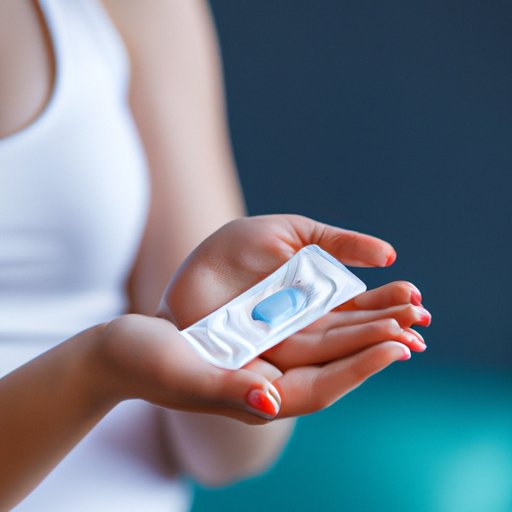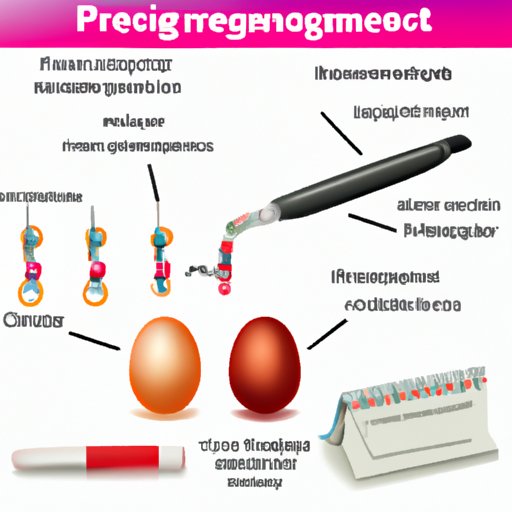
Introduction
Many women have heard the myth that you can’t get pregnant if you’re on your period. This myth has persisted for years, but is it really true? In this article, we will explore the science behind pregnancy with a period and explain why it is possible to become pregnant during menstruation. We will also discuss the importance of proper contraception and share stories from real women who thought they had their period while they were pregnant.
Demystifying the Myth: Can You Really be Pregnant With a Period?
The idea that you can’t get pregnant while on your period is a common misconception. While it is less likely, it is still possible to become pregnant during menstruation. This myth likely exists because it is more difficult to conceive during the early stages of menstruation, but sperm can survive for up to five days inside the female body. This means that if ovulation occurs during or right after menstruation, there is still a possibility of fertilization.
Understanding the Menstrual Cycle and Its Relation to Pregnancy
The menstrual cycle is the process by which the female reproductive system prepares for pregnancy. It averages around 28 days and involves the shedding of the uterine lining (menstruation), follicular development (leading to ovulation), and the secretion of hormones such as estrogen and progesterone. Ovulation is the release of a mature egg from the ovary into the fallopian tubes, where it is available for fertilization. If fertilization does not occur, the uterine lining is shed during menstruation.
Pregnancy and menstruation are related because both involve the uterine lining. During pregnancy, the fertilized egg implants itself into the lining of the uterus and begins to grow. If fertilization does not occur, the lining is shed during menstruation. This is why women who are pregnant do not experience a menstrual cycle.

The Science Behind Pregnancy With a Period
Implantation bleeding is a common occurrence during early pregnancy and can often be mistaken for a period. This bleeding occurs when the fertilized egg implants itself into the uterine lining, causing some light spotting. It is not as heavy as a regular period and usually occurs around the time of your expected period. Other types of bleeding during pregnancy can also occur, such as subchorionic hemorrhage or cervical bleeding, but these are less common.
Why some women may experience bleeding during pregnancy is not always clear. In some cases, it may be due to a miscarriage or ectopic pregnancy. However, many women who experience bleeding during pregnancy go on to have a healthy pregnancy. If you experience bleeding during pregnancy, it is important to consult a doctor to determine the cause.
Why Some Women Experience Bleeding While Pregnant
Some women may experience bleeding during pregnancy due to a variety of reasons. Miscarriage and ectopic pregnancy are potential causes of bleeding during pregnancy, but there are other reasons as well. These include vaginal infection, cervical irritation, or changes to the cervix caused by sexual activity. It is important to consult with a doctor if you’re experiencing any bleeding during pregnancy, no matter how light.
The Importance of Proper Contraception: Avoiding Pregnancy With a Period
Proper contraception is an essential part of any woman’s reproductive health. There are many types of contraception available, including birth control pills, condoms, cervical caps, and IUDs. Using contraception not only prevents unplanned pregnancy, but it can also help regulate your menstrual cycle and prevent symptoms such as cramping and heavy bleeding. If you are sexually active and not planning on becoming pregnant, it is important to choose a method of contraception that works best for you.
How to Recognize the Signs of Pregnancy During Your Period
It is possible to be pregnant while experiencing bleeding similar to a period. The best way to tell if you’re pregnant is to take a pregnancy test. However, there are some signs that you may be pregnant despite bleeding. These include fatigue, breast tenderness, nausea and vomiting, and a missed period. If you’re experiencing any of these symptoms, it is important to see a doctor for confirmation.
Real Life Stories: Women Who Thought They Had a Period While Pregnant
Many women have shared stories of experiences where they believed they had their period while pregnant. One woman shared that she continued to have a regular period throughout her entire pregnancy, leading her to not realize she was pregnant until she was five months along. Another woman experienced light bleeding for several weeks during her first trimester, which she assumed was a period until an ultrasound showed otherwise. These stories illustrate that it is possible to be pregnant with a period and that every woman’s experience is unique.
Conclusion
While it is a common myth that you can’t get pregnant while on your period, it is important to understand the science behind the menstrual cycle and pregnancy in order to know the facts. Proper contraception is key to avoiding pregnancy if it is not desired, and recognizing the signs of pregnancy is important for early detection. By understanding the complexities of the female reproductive system, we can empower women to make informed decisions about their health and their bodies.




